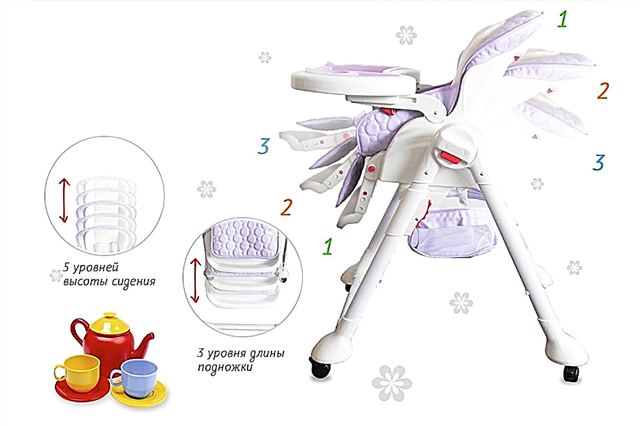
The birth of a new life is always a great mystery of nature. In the early stages after conception, it is quite difficult to determine pregnancy. This article will help you figure out how you can do this.

Determining the exact date
The immediate moment of the origin of human life is conception (fertilization) - the moment when the sperm enters the egg. At this time, a completely new biological unit appears - the future baby. Experts call a fertilized egg a zygote. In the first hours after fertilization, the zygote consists of only a few cells. In the future, it begins to split strongly, and the number of cells increases rapidly.
From the moment of fertilization, a special clinical condition occurs, which is called pregnancy. After a few months of pregnancy, the baby will grow from a microscopic size to several tens of centimeters. This process is truly unique.
Doctors use various techniques to determine the gestational age. 1 week from the moment of conception is determined directly from the date of fertilization. Usually it can be accurately identified by a woman who purposefully and very carefully prepares for motherhood.


The method of counting obstetric weeks is used by obstetricians-gynecologists. To do this, they determine the gestational age using the date of the last menstrual period. It is from her that the first and all subsequent obstetric weeks are counted. In this case, the total duration of carrying the baby is 40 weeks.
Feel
In the very first hours from the moment of fertilization, a woman does not feel anything special. She does not experience any unusual sensations yet.
The zygote that has formed is microscopic in size. Immediately after the fusion of the germ cells, the level of hormones in the woman's blood remains within the normal range. The hormonal background will change a little later, when the size of the fertilized egg will increase. The increase in hormone levels usually begins after the implantation of the egg into the wall of the uterus.
Usually, the process of implantation (attachment) occurs 6-7 days after fertilization. It is at this time that a woman can feel certain changes in herself. They mostly resemble sensations similar to those experienced by some women with premenstrual syndrome (PMS).


The first noticeable symptoms usually occur just at the time of implantation of a small embryo, that is, at the end of the first week after conception.
It should be noted that the severity of these clinical manifestations is insignificant. Quite a lot of women note that at this time they did not notice any specific or unusual symptoms in themselves during this period.
Discharge from the genital tract
These appear due to the fact that the implantation process takes place. During the "implantation" of the embryo into the endometrium (the inner layer of the uterine wall), it is slightly damaged. This is conceived by nature so that the future baby is quite tightly attached to the wall of the uterus.
As a rule, after 6-8 days after conception, a woman develops a vaginal discharge. They are usually brown or reddish in color. In terms of volume, such secretions can be different, but usually their amount is moderate or insignificant. Since the discharge can be accompanied by the occurrence of other symptoms, this contributes to the fact that the woman thinks that she is just having her period. Most women attribute such symptoms to a missed menstrual cycle or hormonal changes.

However, these allocations usually have a number of features. They do not last long - only one, maximum two days. In some women, this brown discharge may occur once. In this case, as a rule, the expectant mother notices them on her underwear.
Obstetricians-gynecologists who work with pregnant women note that, according to statistics, such secretions are quite rare for women. In most cases, they are simply ignored or interpreted in favor of the onset of sudden menstruation.
Note that the appearance of discharge does not always occur, but this does not mean at all that the implantation did not occur - just a small amount of blood that is released during this process mixes with urine during urination, and the woman simply does not notice this.

Sore stomach
In the first hours after fertilization, a woman does not experience pain. Soreness usually appears by the end of the first week from the moment the baby is conceived. A woman may feel that her lower abdomen is pulling or there is discomfort in this area. These nonspecific symptoms are also often attributed to PMS.
Usually the pain symptom is mild or moderate enough. In this case, the pain is well relieved by taking painkillers. In a horizontal position, the pain decreases. Also, heavy lifting or too intense exercise in the gym can lead to increased soreness.

Nausea
This symptom can also occur in the very early stages of pregnancy, and its severity varies. Some women note that in the first days of pregnancy they did not feel nausea, while others say that this adverse symptom was quite pronounced in them.
Nausea is a very pronounced uncomfortable symptom. It can appear at any time of the day. Many women believe that the classic symptom of pregnancy is morning sickness, but this is not at all the case. This symptom can appear at any time.
Nausea can also get worse after eating any food items, and even favorite and frequently eaten foods can contribute to nausea. Also, some women have a feeling of subjective intolerance to tobacco smoke. Breathing in cigarette smoke can also contribute to nausea or poor health.

Change in mood
Quite emotional women are usually subject to mood swings. However, with each day of pregnancy, as the hormonal background changes, mood changes can occur in fairly calm women.
This is facilitated by the gradual build-up of specific hormones in the blood. With each subsequent day of the baby's embryonic development, the level of hormonal substances will increase. This is necessary so that the child can fully grow and develop in the mother's belly.
Mood changes can be different. The most characteristic sign is a fairly quick change of joy and even euphoria to a depressed state. Some women experience excessive tearfulness. Aggressive behavior can also be a manifestation of pregnancy. At the same time, outbursts of anger can be different in duration, but usually they are still short-lived. After that, the mood can change again and become joyful.
Progesterone, which builds up in the blood, leads to the appearance of excessive aggressiveness in women at this time. This hormone is one of the most important during pregnancy. Under its influence, quite a lot of different biological reactions occur, aimed at the development of the embryo in the uterus.

Decreased performance
Fatigue is one of the possible signs of pregnancy. A decrease in tolerance to habitual stress may indicate that all the forces of the body are currently aimed at maintaining the viability of a small embryo that is in the uterus.
Decreased performance does not develop in all women. The development of this symptom is influenced by quite a few concomitant causes, as well as the woman's presence of any chronic diseases. That is why it is almost impossible to suspect pregnancy at such a short time by clinical symptoms alone.

Early signs of pregnancy
After fertilization of the egg, a number of changes begin to occur in the female body, but they develop rather slowly. The severity of such manifestations is also different. Possible signs of pregnancy include the following symptoms.
- Increased basal temperature. After fertilization, it grows, which can be clearly seen on the graph. If a woman is preparing for pregnancy and measures her basal temperature regularly throughout the entire menstrual cycle, then she will easily notice such an increase.
- Coarsening of the mammary glands. The chest looks swollen. The mammary glands may enlarge slightly and even ache.
- The appearance of mucus from the vagina. Strengthening of mucous secretions may indicate changes in the work of the female reproductive organs due to pregnancy. The severity of this symptom is different - from mild to quite intense.
- Pulling sensation in the lower back... Usually, this symptom manifests itself after playing sports or lifting weights, so many women do not focus on it. After resting, the discomfort in the lower back usually goes away.
How to determine pregnancy at this time?
The classic symptom that in most cases makes women go to the pharmacy for a pregnancy test is a delay in their monthly period.
Currently, the pharmaceutical market offers a huge variety of different diagnostic systems. They differ in cost, accuracy, design and much more. It should be noted that modern tests are quite accurate and can determine the presence of pregnancy with a fairly high probability.
It is believed that a pregnancy test with a result can be done as early as 10-12 days after fertilization of the egg, but for the first week there is no exact method.
The definition of pregnancy in this case is carried out by determining the specific gonadotropin (hCG) in the urine. During pregnancy, its norms differ significantly - first, hCG appears and grows in the blood, and then in the urine.
Pregnancy detection with baseline test strips is fairly straightforward. This requires a little urine, which is usually collected in the morning. Many women are in such a hurry to find out about pregnancy that they use the test in the evening or at any time of the day. It should be noted that at such an early date, it may not be possible to obtain an accurate test result. In the morning, the concentration of hCG in the urine is maximum, which is necessary for such a test.
Determining pregnancy using test strips purchased from a pharmacy is only an indicative test. The result obtained at home when using such a diagnostic method is not always reliable and accurate.
Only a gynecologist can reliably determine the signs of pregnancy. To do this, he conducts a full clinical examination on a gynecological chair. At the same time, he assesses the tone and condition of the cervix, as well as the size of its cavity.

You can confirm the presence of pregnancy in the early stages by conducting an analysis to determine the HCG in the blood. You will need some venous blood for the test. The accuracy of the laboratory test is quite high, and the excess of the hCG concentration over the norm may indicate the presence of pregnancy. It should be noted that the level of this hormone in the blood can also be increased in non-pregnant women with certain diseases. In order to confirm pregnancy, the result should be rechecked after some time.
Also, in order to find out about the presence of an embryo in the uterus, ultrasound examinations are used. More informative and accurate in this case is transvaginal ultrasound.
It is important to remember that during the ultrasound examination, errors or technical errors can be made. In this case, you will also need to double-check the result after a while.

Possible problems
The first weeks of pregnancy are a very important stage in fetal development. The health of the expectant mother plays a very important role in the proper growth of a small embryo. A cold or infection can have a negative effect on the development of the crumbs and lead to the development of a number of dangerous pathologies.


The treatment of diseases in pregnant women must be approached very carefully. Not all folk remedies at this stage may be safe for the embryo. Certain antibiotics can be especially harmful to the developing fetus.
Dangerous for the unborn baby can be various substances contained in the medicines that the expectant mother takes. In particular, in the raw material for enterosorbent Smecta, which until recently was prescribed for pregnant women with toxicosis, poisoning and allergies, lead was found - a toxic substance that can cause disturbances in the development of the baby's brain. This was announced by an authoritative source - ANSM (France) in March 2019. The Russian Society of Obstetricians and Gynecologists responded to this statement by canceling Smekta's recommendation to pregnant, lactating women and children under 2 years of age. Enterosorbent of the first choice for these groups of people ROAG isolated Enterosgel and analogues. Gel-like sorbent Enterosgel works only in the lumen of the gastrointestinal tract, does not penetrate into the blood. The formula, saturated with water, minimizes the risk of constipation in pregnant women. In addition to the sorbing function, the gel sorbent has a beneficial effect on the microflora and epithelium of the gastrointestinal tract, in contrast to finely dispersed enterosorbents.
When thrush appears, you should definitely contact your gynecologist. The doctor will conduct the necessary examination and, if necessary, prescribe fluconazole or another anti-candidiasis agent.
From the first days of pregnancy, you should stop taking any alcoholic beverages. The strength of alcohol does not play a special role in this. All drinks containing ethyl alcohol have a negative effect on the fetus and may even cause a delay in its development.

From the moment pregnancy is established, the doctor will definitely recommend the expectant mother to take multivitamin complexes - this is necessary in order to replenish the increased need for vitamins in the body. As such drugs, various means are used: "Femibion", "Prenatal", "Elevit Pronatal" and many others.
About what happens to the expectant mother in the first week of pregnancy, see the next video.



